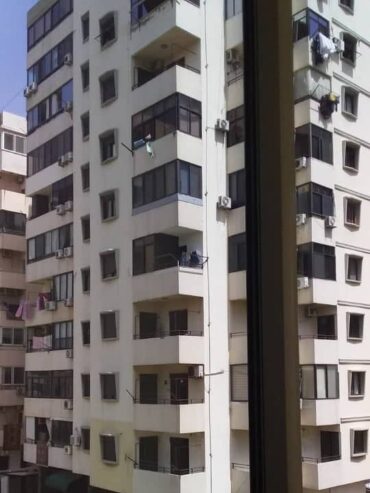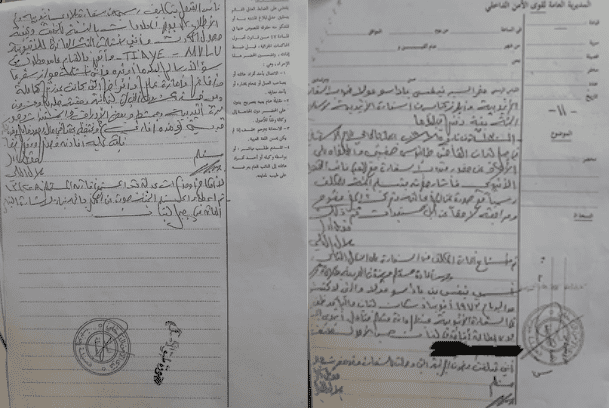THE STORY
This story was first published in the Addis Standard in July 2019 as part of a broader investigation into Ethiopian migrant domestic worker deaths in Lebanon.
Mulu Tilaye Tekle was born in the rural Amhara region’s North Shewa zone. She had barely turned 20 when she arrived in Lebanon in 2017, eager to find work that would help support her family back home. Her older sister, Zenebech, had made the trip before her and had a consistent source of income based through her work in a home in Beirut. Mulu sought to double the family’s earnings and thought the presence of her sister would render the transition to life in Lebanon easier. But it wasn’t to be. The two would never even meet. Mulu thought she had found legitimate employment when she moved into the home of Elie Kahwach, a 50 year old retired Lebanese Army officer, and his wife Pauline Chahine, 41.
The couple and their two children live in an apartment on the 5th floor of a building located in the Lebanese coastal town of Jounieh, just north of Beirut. There, Mulu worked all week with no breaks. Pay was intermittent at best, before becoming a rarity altogether, says Mulu’s brother, Wolde Tilaye.
“At first she would send me money through her employers on a regular basis. Later, I wouldn’t know when she was being paid,” Wolde told Addis Standard from his home in Addis Ababa. “But before her death, she had not been paid for at least three months.”
If the lack of clarity surrounding her pay wasn’t worrying enough, the fact that she was kept a virtual prisoner in the apartment meant that the family was unable to verify if she was being abused by her employers, an extremely common occurrence. Mulu was never allowed to either leave the premises on her own or even possess a mobile phone. The latter would have permitted her to remain in regular contact with her family in Ethiopia and her sister in Lebanon. But the only time she was ever allowed to contact her family was when Elie Kahwach allowed it. He’d set her up with a VoIP app on his own phone with which she would be allowed to speak with her brother for a few minutes. Then the line would cut and that would be it. “Caller display always showed a different number. I could never call and actually reach her,” Wolde recalls. “But she always sounded fearful, frightened. She did tell me she couldn’t speak openly because the man was watching her as she spoke.”
Her sister was especially worried that something was happening to her. In the year or so since her hiring, she had not once been permitted to meet with her sister. Whenever Kahwach or Chahine left the home, they always made sure to lock Mulu inside so she couldn’t venture out. “I was able to find out from neighbors and friends that she was being regularly abused,” her sister Zenebech said. Zenebech accuses Elie Kahwach of personally meting out much of the abuse. “He used to tell her, I’m an army man. I can get away with anything.”
On 12 April 2019, it all became too much for Mulu. Desperate to escape her circumstances, she took the plunge, jumping from the balcony of the 5th floor apartment towards the concrete ground below. The fall caused numerous bone fractures and internal bleeding that made it impossible to survive. She was 21. Instead of rushing her to the hospital, onlookers gawked and took pictures of the mortally wounded young woman.
In an interview with local media outlet Daily Star, Elie Kahwach denied ever beating or abusing her. “This is not true, it’s not accurate and it’s shameful,” he said. “We would treat her very well, we really liked her.” Despite this, he did admit that he kept Mulu locked in the house.
Through regular contact with members of the This Is Lebanon organization and a network of activists on the ground, Addis Standard has been able to obtain the Lebanese police report into Mulu’s death. According to the report, both Kahwach and his wife Pauline Chahine denied physically abusing Mulu when questioned by police, but did admit that Mulu never had access to a phone and was virtually imprisoned in the home, locked indoors with no way of getting out. They both claimed they had no idea why Mulu would resort to jumping off a 5th floor balcony to escape the home.
Elie Kahwach, who owned the 5th floor apartment Mulu Tilaye worked in, is accused by Mulu’s family of physically assaulting her and keeping her as a slave. Mulu ended up making a fatal jump off the apartment’s balcony in an attempt to escape the home.
Through an undercover collaborator Addis Standard contacted the couple after obtaining their contact information. As Mulu’s brother had alleged that the couple owed his sister three months’ pay, Pauline was first asked to respond to claims that Mulu had worked unpaid between January and 12 April 2019. “It was Mulu’s choice,” Chahine insisted. “She took charge of her own finances. She had asked to use Western Union to send money to her parents every three months.”
It could be true that not all of the money they paid Mulu was sent to her brother Wolde and that perhaps she had chosen on several occasions to hold onto her earnings. However, Chahine’s portrayal of Mulu being in charge of her financial destiny doesn’t hold water when one recalls that the same couple banned her from using a phone or even going outdoors. Addis Standard pressed Chahine on this latter topic.
Elie Kahwach and his wife Pauline Chahine. In her conversation with Addis Standard, Chahine claimed that she had no idea that Mulu had a sister that wanted to visit her. A police report quotes her as admitting that she never allowed Mulu permission to leave the home
Chahine’s claim to have had no idea of Mulu having a sister in Lebanon appears to be a blatant lie. According to the same Lebanese media report cited above, Mulu’s sister, Zenebech, went as far as pleading with GMN, the recruitment agency that sent Mulu to Chahine’s apartment. The man who runs the agency, Nidal Hashem, told the Daily Star that he contacted Pauline and Elie, notified them about the sister’s complaint and asked them to bring Mulu to his office and find another employee for them. “They refused,” he said.
Pauline Chahine admitted to having confined Mulu in a locked space 24 hours a day, seven days a week. Her denial of having any knowledge of Mulu having a sister in Lebanon when available evidence suggests that this isn’t true, further dents her credibility. Addis Standard brought this up in the brief phone exchange with Chahine.
“Both you and your husband admitted that Mulu was always kept within the confines of the home at all times. Why did you not once allow her to leave? Why did you turn her into a prisoner?”
At this point, Chahine became agitated and refused to answer the question, instead redirecting all inquiries to her lawyer before abruptly hanging up.
There are plenty of discrepancies between the versions of the story that Elie Kahwach and Pauline Chahine told Lebanese press and investigators and what really happened. There are grounds for a criminal case being pursued here. The Ethiopian consulate’s mandate would cover lobbying for justice and for the full truth to come out. After all, although proof of the family’s claims of abuse might be somewhat difficult to obtain, Elie Kahwach has openly admitted to committing at least one violation of the UNHCR ratified International Convention on the Protection of Migrant Workers – unlawful restraint.
The Police Report
The police report into Mulu’s death reveals that the Ethiopian consulate did indeed send an official to take charge of the case. The report identifies this official as being 46 year old Nigussie Bedaso Mola, whom Addis Standard learned has spent a sizeable part of his career posted in Beirut. The veteran diplomat met with Lebanese police Warrant Chief Bilal El Ali days after Mulu’s death. Nigussie, described as being fluent in Arabic, gives a sworn statement. “I have taken necessary measures to send her remains back to Ethiopia for burial. I will also send her passport, residence permit and possessions including Lebanese and Ethiopian currency notes, as well as pictures of church saints. I’d like to confirm our legal rights to pursue justice in the case of further information emerging.”
Pages from the Lebanese police report into Mulu Tilaye’s death. These pages identify consular official Nigussie Bedaso Mola as having met with a Lebanese police chief. The document shows that Nigussie did indicate that he’d be willing to pursue a legal case if sufficient evidence of foul play was available. They is evidence that despite his later denials, he did have a mandate that includes pursuing suspected abusers of Ethiopian citizens in the Lebanese court. He is not known to have taken any subsequent action. Censored here is Nigussie’s personal contact information.
The last sentence confirms that Nigussie does indeed have a mandate that includes exploring legal avenues in cases where he is assigned and foul play is suspected.
However, almost three months after having given this statement, Nigussie Bedaso Mola is confirmed to have done absolutely nothing of the kind. Neither Elie Kahwach nor Pauline Chahine have been charged with any crimes. It had been over two months since Mulu’s death when Addis Standard reached the couple by phone, and they appeared surprised that anyone would call regarding the young woman who had died trying to flee their home. And Nigussie Bedaso, the diplomat in charge, is yet to speak with the family let alone hire a lawyer to pursue the truth.
“Nobody,” said Mulu’s father Tilaye Tekle, when asked by Addis Standard whether anyone from the Ethiopian Consulate or government had contacted him about his late daughter. “No, we are alone as a family carrying the burden of this loss.”
Addis Standard tried to contact the consulate office about Nigussie’s inactivity regarding Mulu’s death on several occasions. Despite the secretary at the main desk answering the phone and promising to connect the line with Nigussie’s office, the call would end moments later. Nigussie proved to be elusive when contacted via official consular phone lines. After it became clear that using the office numbers was futile, Addis Standard obtained his personal cellular phone number. After several unsuccessful attempts to reach him, he was sent a text on WhatsApp asking him to explain why, despite his being tasked with overseeing post mortem procedures in the case of Mulu Tilaye and despite his confirming that he was interested in a potential legal case, he had done nothing whatsoever in the two months or so since Mulu died.
He replied: “What do you mean I didn’t call the family? How were we able to send the remains home without contacting the family?” When asked whether he believed his responsibilities were limited to sending coffins home, he answers: “What I know is that the body has been sent home.” He then replied with a picture containing private contact information of someone who appeared to be one of Mulu’s siblings. “We even sent the coroner’s report with the body. Besides, you shouldn’t be contacting me, but the main office.”
When reminded that it was him who was put in charge of the case and that any responsibilities that would see Pauline Chahine and Elie Kahwach appear in court for abuse and contributing to the death of a 21 year old Ethiopian citizen would be his, Nigussie stopped responding. From his responses, it’s clear that he found it inconceivable that one would have expectations of him that go beyond sending her remains home.
His reluctance to act has resulted in Elie Kahwach joining the ranks of Lebanese employers suspected of inflicting horrendous abuse on Ethiopian domestic workers and not being held accountable.
Meet The Abusers
These are the abusers and those who looked onto Mulu's case and chose to continue the abuse or look away.
“Pauline Chahine admitted to having confined Mulu in a locked space 24 hours a day, seven days a week” - Addis Standard
القصة
نُشرت هذه القصة لأول مرة في مجلة أديس ستاندرد في تموز 2019 كجزء من تحقيق واسع النطاق في وفاة عاملات المنازل الأثيوبيات المهاجرات في لبنان.
ولدت مولو تيلاي تيكله في ولاية أمهرة الريفية شمال منطقة شيوا. كانت بالكاد قد بلغت سن العشرين عندما وصلت إلى لبنان في عام 2017، متلهفة للعثور على عمل من شأنه أن يساعد أسرتها في بلدها. كانت أختها الكبرى زينبيك قد سافرت قبلها، وكان لها مصدر دخل ثابت في منزل في بيروت. سعت مولو لمضاعفة دخل الأسرة واعتقدت أن وجود أختها سيجعل الانتقال إلى الحياة في لبنان أسهل. لكن ذلك لم يحدث. لم تجتمع الاثنتان أبداً. ظنت مولو أنها وجدت عملاً مشروعاً عندما انتقلت إلى منزل إيلي قحوش وهو ضابط متقاعد في الجيش اللبناني يبلغ من العمر 50 عاماً، وزوجته بولين شاهين 41 عاماً.
يعيش الزوجان وطفليهما في شقة في الطابق الخامس من مبنى يقع في مدينة جونيه الساحلية اللبنانية شمال بيروت. هناك، عملت مولو طوال الأسبوع بدون استراحة. كان الدفع متقطعاً في أحسن الأحوال قبل أن يصبح نادراً تماماً، يقول شقيق مولو، وولدي تيالي.
أخبر وولدي أديس ستاندرد من منزله في أديس أبابا: "في البداية كانت ترسل لي المال عن طريق أصحاب عملها بشكل منتظم. فيما بعد لم أكن أعرف متى يتم الدفع لها. لكن قبل وفاتها لم تحصل على أجر لمدة ثلاثة أشهر على الأقل".
إذا كان الغموض الذي يلف بقضية أجورها لا يدعو للقلق بما يكفي، فإن كونها سجينة محتجزة في الشقة ولو افتراضياً، يعني أن أسرتها لم تتمكن من التحقق فيما إذا كانت قد تعرضت للتعنيف من قِبل أصحاب عملها، وهذا أمر شائع للغاية. لم يُسمح للعاملة مولو مطلقاً بمغادرة المبنى بمفردها أو حتى امتلاك هاتف محمول. كان من الممكن أن يسمح لها الهاتف بالبقاء على اتصال دائم مع أسرتها في إثيوبيا وشقيقتها في لبنان. لكن المرة الوحيدة التي ُسمح َ لها فيها بالاتصال بعائلتها كانت عندما سمح إيلي قحوش بذلك. لقد وضع الإعدادات لها في تطبيق VoIP على هاتفه الخاص، وسمح لها بالتحدث مع شقيقها لبضع دقائق. ثم كان الخط ينقطع و تنتهي المكالمة. يتذكر وولدي: "أظهر عرض المتصل دائماً رقماً مختلفاً دائماً. لم يكن بإمكاني الاتصال بها أو الوصول إليها في الواقع. لكنها بدت خائفة ومرتعبة. أخبرتني أنها لا تستطيع التحدث بصراحة لأن الرجل كان يراقبها وهي تتكلم."
كانت شقيقتها قلقة بشكل خاص من أنها ليست بخير. لم يُسمح لها على الإطلاق أن تلتقي شقيقتها خلال العام الذي عملت فيه. كلما غادر قحوش أو شاهين المنزل، كانا يحرصان دائماً على إقفال الباب على مولو في الداخل حتى لا تتمكن من الخروج. قالت شقيقتها زينبيك: "لقد عرفت من الجيران والأصدقاء أنها كانت تتعرض للتعنيف بشكل دائم". تتهم زينبيك إيلي قحوش شخصياً بارتكاب الكثير من الانتهاكات. "كان يقول لها أنا رجل في الجيش. يمكنني الإفلات من أي شيء."
في 12 نيسان 2019 فاض الكيل بالنسبة ل "مولو". في محاولة يائسة للهرب من ظروفها، عقدت عزمها و قفزت من شرفة شقة الطابق الخامس نحو الأرض الصلبة في الأسفل. تسبب السقوط في كسور متعددة في العظام ونزيف داخلي، الأمر الذي جعل نجاتها مستحيلة. كانت تبلغ من العمر 21 عاماً. وبدلاً من الإسراع بها إلى المستشفى، راح المتفرجون يحدّقون بها ويلتقطون صوراً للمرأة المصابة بجروح مميتة.
في مقابلة مع صحيفة ديلي ستار المحلية، أنكر إيلي قحوش ضربها أو الإساءة إليها قط. وقال "هذا غير صحيح، إنه غير دقيق، إنه أمر مخجل. كنا نعاملها معاملة حسنة جداً، لقد أحببناها حقاً." وعلى الرغم من ذلك، اعترف بأنه كان يحتجز مولو في المنزل.
من خلال الاتصال المتكرر مع أعضاء جمعية "هذا لبنان" وشبكة من الناشطين ميدانياً، تمكنت "أديس ستاندرد" من الحصول على تقرير الشرطة اللبنانية عن وفاة مولو. ووفقاً للتقرير فقد أنكر قحوش وزوجته بولين شاهين الاعتداء الجسدي على مولو عندما استجوبتهما الشرطة، لكنهما اعترفا بأن مولو لم تتمكن مطلقاً من الاتصال بالهاتف و أنها كانت بحكم السجينة فعلاً في المنزل، مقفلاً عليها بدون أية وسيلة للخروج. وادّعى الاثنان أنه ليس لديهما أية فكرة عن سبب لجوء مولو إلى القفز من شرفة الطابق الخامس للهرب من المنزل.
المبنى المكون من 10 طوابق الذي كانت مولو تالي محتجزة فيه وتوفيت أخيراً وهي تحاول الفرار منه - الصورة: "هذا لبنان"
إيلي قحوش صاحب الشقة في الطابق الخامس التي عملت فيها مولو تيالي، تتهمه عائلة مولو بالاعتداء عليها جسدياً. انتهى الأمر ب "مولو" إلى القفز المميت من شرفة الشقة في محاولة للهروب من المنزل.
من خلال أحد المتعاونين السريين، اتصلت أديس ستاندرد بالزوجين بعد الحصول على معلومات الاتصال الخاصة بهما. بما أن شقيق مولو قد زعم أن الزوجين مدينان لأخته بأجر ثلاثة أشهر، فقد ُطلب من بولين أولاً الرد على الادعاءات بأن مولو عملت بدون أجر بين كانون الثاني و 12 نيسان. أصرّت شاهين قائلة: "كان ذلك خيار مولو." لقد تولت مسؤولية شؤونها المالية. وطلبت استخدام ويسترن يونيون لإرسال الأموال إلى والديها كل ثلاثة أشهر.
قد يكون صحيحاً أنه لم يتم إرسال كل الأموال التي دفعوها ل "مولو" إلى شقيقها وولدي، وربما اختارت في عدة مناسبات الاحتفاظ بأجورها. ومع ذلك فإن وصف شاهين ل "مولو" بأنها مسؤولة عن مصيرها المالي لا يُصدق عندما يتذكر المرء أن الزوجين نفسهما منعاها من استخدام الهاتف أو حتى الخروج من المنزل. ضغطت أديس ستاندرد على شاهين في هذا الموضوع الأخير.
يبدو أن ادّعاء شاهين بأنه لم تكن لديها فكرة عن وجود أخت ل "مولو" في لبنان كذبة فاضحة. وفق للتقرير الإعلامي اللبناني نفسه المذكور أعلاه، فإن زينبيك أخت مولو ذهبت إلى حد التوسل إلى وكالة التوظيف التي أرسلت مولو إلى شقة شاهين. وقال الرجل الذي يدير الوكالة، نضال هاشم، لصحيفة ديلي ستار إنه اتصل مع بولين وإيلي، وأبلغهما بشكوى الأخت وطلب منهما إحضار مولو إلى مكتبه وإيجاد عاملة أخرى لهما. قال: "لقد رفضا."
اعترفت بولين شاهين بحبس مولو في مكان مغلق على مدار الساعة وطوال أيام الأسبوع. إن إنكارها التام لعلمها بوجود أخت ل "مولو" في لبنان عندما تشير الأدلة المتاحة إلى أن هذا غير صحيح، يطعن في مصداقيتها. ذكرت أديس ستاندرد هذا في محادثة هاتفية وجيزة مع شاهين. "لقد اعترفتِ أنت وزوجك أن مولو كانت دائما محتجزة داخل حدود المنزل في جميع الأوقات. لماذا لم تسمحي لها مرة بالمغادرة؟ لماذا حولتها إلى سجينة؟"
عند هذه النقطة انفعلت شاهين ورفضت الإجابة على السؤال وبدلاً من ذلك أحالت جميع الاستفسارات إلى محاميها قبل إنهاء المكالمة فجأة.
هناك الكثير من التناقضات بين روايات القصة التي أخبرها إيلي قحوش وبولين شاهين للصحافيين والمحققين اللبنانيين وبين ما حدث بالفعل. هناك أساس لقضية جنائية يجري متابعتها هنا. إن تفويض القنصلية الإثيوبية من شأنه أن يشمل ممارسة الضغوط من أجل العدالة ومن أجل التوصل إلى الحقيقة الكاملة. في النهاية، وعلى الرغم من أن إثبات ادعاءات الأسرة بالتعنيف قد يكون صعباً إلى حد ما، إلا أن إيلي قحوش اعترف صراحة بارتكاب انتهاك واحد على الأقل للاتفاقية الدولية لحماية العمال المهاجرين التي صدّقت عليها مفوضية الأمم المتحدة لشؤون اللاجئين – الحجز غير القانوني.
تقرير الشرطة
يكشف تقرير الشرطة حول وفاة مولو أن القنصلية الإثيوبية أرسلت بالفعل مسؤولاً لتولي القضية. يحدد التقرير هذا المسؤول بأنه نيغوسي بيداسو مولا، البالغ من العمر 46 عاماً، والذي علمت أديس ستاندرد أنه قد أمضى جزءاً كبيراً من حياته المهنية في بيروت. التقى الدبلوماسي المخضرم برئيس الشرطة اللبنانية بلال العلي بعد أيام من وفاة مولو. أعطى نيغوسي، الذي يوصف بأنه يجيد اللغة العربية، بياناً محلّفاً. "لقد اتخذت التدابير اللازمة لإرسال رفاتها إلى إثيوبيا لدفنها. سأرسل أيضاً جواز سفرها وتصريح الإقامة وممتلكاتها، بما في ذلك العملات الورقية اللبنانية والإثيوبية، وكذلك صور قديسي الكنيسة. أرغب في تأكيد حقوقنا الشرعية في السعي لتحقيق العدالة في حال ظهور المزيد من المعلومات."
صفحات من تقرير الشرطة اللبنانية عن وفاة مولو تالي. تحدد هذه الصفحات المسؤول القنصلي نيغوسي بيداسو موال بأنه التقى قائد شرطة لبناني. توضح الوثيقة أن نيغوسي أشار إلى إستعداده لمتابعة قضية قانونية في حال توفر دليل كاف على سلوك غير قانوني. رغم إنكاره اللاحق، هناك دليل على وجود تفويض لديه يتضمن ملاحقة المشتبه بإساءة معاملته للمواطنين الإثيوبيين في المحكمة اللبنانية. لا يُعرف عنه أنه اتخذ أي إجراء لاحق. معلومات الاتصال الشخصية الخاصة ب "نيغوسي" هنا هي محجوبة.
تؤكد الجملة الأخيرة أن نيغوسي لديه بالفعل تفويض يتضمن استكشاف السبل القانونية في الحالات التي يتم تعيينه فيها ويشتبه بوجود سلوك غير قانوني فيها.
ومع ذلك، بعد مرور ثلاثة أشهر تقريباً على الإدلاء بهذا التصريح، من المؤكد أن نيغوسي بيداسو مولا لم يفعل شيئاً من هذا القبيل على الإطلاق. لم يتم اتهام إيلي قحوش أو بولين شاهين بأية جرائم. كان قد مر أكثر من شهرين على وفاة مولو عندما اتصلت أديس ستاندرد بالزوجين عبر الهاتف، وبدا أنهما قد فوجئا بأن أحداً ما سيتصل بخصوص الشابة التي توفيت وهي تحاول الهرب من منزلهما. ولم يتحدث الدبلوماسي المسؤول نيغوسي بيداسو مع العائلة حتى الآن، ناهيك عن تعيين محام لمعرفة الحقيقة.
عندما سألته أديس ستاندرد إن كان أي شخص من القنصلية أو الحكومة الإثيوبية قد اتصل به بشأن ابنته الراحلة، قال والد مولو، تيالي تيكل: "لا أحد." "كلا، نحن وحدنا كأسرة نتحمل عبء هذه الخسارة".
حاولت أديس ستاندرد الاتصال بمكتب القنصلية بشأن تقاعس نيغوسي حيال وفاة مولو في عدة مناسبات. وعلى الرغم من قيام السكرتير في المكتب الرئيسي بالرد على الهاتف ووعده بتوصيل الخط بمكتب نيغوسي، فإن المكالمة كانت تنتهي بعد لحظات. أثبت نيغوسي أنه بعيد المنال عند الاتصال به عبر خطوط هاتف القنصلية. بعد أن اتضح أن استخدام أرقام المكاتب كان غير ذي جدوى، حصلت أديس ستاندرد على رقم هاتفه الخلوي الشخصي. بعد عدة محاولات للاتصال به باءت بالفشل، تم إرسال رسالة نصية عبر واتس آب يطلبون منه أن يشرح سبب عدم فعله أي شيء على الإطلاق في مدة الشهرين أو نحو ذلك منذ وفاة مولو، على الرغم من تكليفه بالإشراف على إجراءات ما بعد الوفاة في قضية مولو تيالي، وعلى الرغم من تأكيده على اهتمامه بقضية قانونية مرتقبة.
أجاب: "ماذا تقصد بأنني لم أتصل بالعائلة؟ كيف استطعنا إرسال الجثمان إلى بلدها دون الاتصال بالعائلة؟ وكان ردّه عندما سّئل عما إذا كان يعتقد أن مسؤولياته تقتصر على إرسال الأكفان إلى الوطن بأن قال: "ما أعرفه هو أنه قد تم إرسال الجثمان إلى الوطن." ثم أجاب بصورة تتضمن معلومات اتصال خاصة لشخص يبدو أنه أحد أشقاء مولو. "لقد أرسلنا تقرير الطبيب الشرعي مع الجثة. بالإضافة إلى ذلك، يجب ألّا تتصل بي، بل بالمكتب الرئيسي."
حين تم تذكيره بأنه هو الذي كُلّفَ بالقضية وبأنها مسؤوليته أن يجعل بولين شاهين وإيلي قحوش يمثلان أمام المحكمة للتعنيف والمساهمة في وفاة مواطنة إثيوبية تبلغ من العمر 21 عاماً فهي تقع على عاتقه، امتنع نيغوسي عن الاستجابة. من الواضح من إجاباته أنه لم يتصور بأن يكون لدى المرء توقعات منه تتجاوز إرسال رفاتها إلى بلدها.
لقد أدى إحجامه عن التصرف إلى انضمام إيلي قحوش إلى صفوف أصحاب العمل اللبنانيين الذين يشتبه في تعنيفهم الفظيع لعاملات المنازل الإثيوبيات وإفلاتهم من الخضوع لأية محاسبة.








